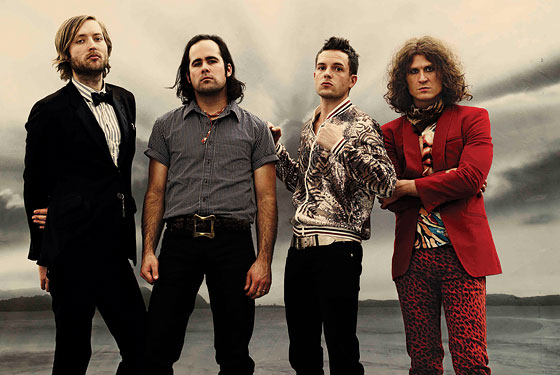
Maybe it was growing up impossibly handsome. Perhaps it had something to do with rapidly selling 3 million copies of his band’s 2004 debut, Hot Fuss. Whatever the reason, singer-keyboardist Brandon Flowers found the confidence to promise that Sam’s Town, the Killers’ 2006 album, was certain to rank as “one of the best albums in the last twenty years.” Popular opinion, when it came down, did not support this view. Flowers and his bandmates (drummer Ronnie Vannucci, bassist Mark Stoermer, and guitarist David Keuning) had openly modeled the disc on Born to Run–era Bruce Springsteen, and while the single “When You Were Young” unapologetically blended the mawkish and ballsy as only great pop-rock can, the rest of the lot sounded similar to last night’s karaoke. But like a story right out of Springsteen’s America, the Killers redeem themselves with their new Day & Age, abandoning (for the most part) their pretensions and coming to terms with who they really are: cheesy pop geniuses.
If there is only one Boss, let us acknowledge that there is also only one Flowers: a metrosexual man for his time. A true product of Las Vegas, an elder of the Facebook generation, he has now turned from bad karaoke to good, and not by merely returning to the band’s new-wavy Hot Fuss roots (such as they are). Producer Stuart Price —who, as “Jacques Lu Cont,” once created the eighties-fetishizing, faux-French dance project Les Rythmes Digitales—helped the band concoct ten different sounds, one for each of Day & Age’s songs. Want a taste of Tropicália? Skip to “I Can’t Stay.” The steel drums of “Joy Ride” channel the Clash channeling world music. And on “Human,” the album’s first single, that’s none other than a rippling, house-music synthesizer hook, as universal a marker of musical Gouda as adult contemporary’s saxophone solos. Did we mention there are sax solos, too? The organizing principle here is If it sounds good, use it.
The disc ultimately hangs together on mood; Price unfailingly accentuates the bright, shiny, and happy. This not only makes good pop sense, it provides an effective counterbalance to Flowers and his achy-breaky vocals. Though he oozes showbiz in his personal style, Flowers was raised Mormon and is married to a schoolteacher. This homespun side of him is amply exhibited in his lyrics. “A Dustland Fairytale,” which could be an otherwise solid Sam’s Town outtake, holds in its gauzy gaze a “slick chrome American prince” who meets a “Cinderella in a party dress” and ends up with his “soul on fire.” With these cardboard characters, Flowers means to show that he understands the outsize figures that animate American history. Or something. When it comes to deep thoughts, Flowers gets in way over his head. He once told me, in an interview for another magazine, that the chorus to “Human”—“Are we human? Or are we dancer?”—was not a cheeky line meant for a wink in the club, but a serious statement about modern life, inspired by none other than Hunter S. Thompson.
For all his talk of chrome-plated princes, extraterrestrials, and a mysterious race of dancers, Flowers is at his finest when he doesn’t think too hard, churning out bittersweet hooks and surrendering to the logic of the shuffle on his iPod, where Bruce Springsteen cycles in after Depeche Mode, and, hey, look, iTunes Genius just recommended something called Les Rythmes Digitales. That’s modern life, and unnecessarily fretting over it is what sent him, for the last album, deep into bolo ties, creative facial hair, and the big ideas he thought those things signified. And while he may continue to worry—the band did give this album the portentous title Day & Age—Flowers, thankfully, embraced his pop instincts and the felicity of borrowing whatever might please his, or his fake French producer’s, ear.
Day & Age
The Killers.
Island Records. $13.98.